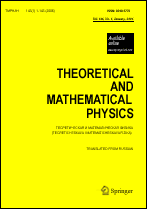|
This article is cited in 2 scientific papers (total in 2 papers)
Dissipation effects in infinite-dimensional Hamiltonian systems.
S. M. Saulin
Lomonosov Moscow State University, Moscow, Russia
Abstract:
We show that the potential coupling of classical mechanical systems (an oscillator and a heat bath), one of which (the heat bath) is linear and infinite-dimensional, can provoke energy dissipation in a finite-dimensional subsystem (the oscillator). Under natural assumptions, the final dynamics of an oscillator thus reduces to a tendency toward equilibrium. D. V. Treschev previously obtained results concerning the dynamics of an oscillator with one degree of freedom and a quadratic or (under some additional assumptions) polynomial potential. Later, A. V. Dymov considered the case of a linear oscillator with an arbitrary (finite) number of degrees of freedom. We generalize these results to the case of a heat bath (consisting of several components) and a multidimensional oscillator (either linear or nonlinear).
Keywords:
Lagrange system, system with infinite number of degrees of freedom,
final dynamics.
Received: 07.10.2015
Revised: 28.03.2016
Citation:
S. M. Saulin, “Dissipation effects in infinite-dimensional Hamiltonian systems.”, TMF, 191:1 (2017), 78–99; Theoret. and Math. Phys., 191:1 (2017), 537–557
Linking options:
https://www.mathnet.ru/eng/tmf9062https://doi.org/10.4213/tmf9062 https://www.mathnet.ru/eng/tmf/v191/i1/p78
|


| Statistics & downloads: |
| Abstract page: | 648 | | Full-text PDF : | 192 | | References: | 87 | | First page: | 21 |
|




 Contact us:
Contact us: Terms of Use
Terms of Use
 Registration to the website
Registration to the website Logotypes
Logotypes









 Citation in format
Citation in format 
